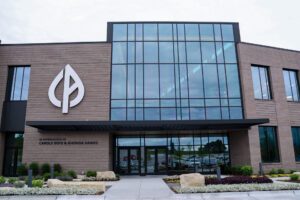Mental Health Counseling Support at Community Alliance Has Become More Important Than Ever

Counseling Awareness Month takes on a new level of importance during a pandemic, when every life has been impacted in some way by worry and stress. Even prior to the COVID-19 crisis, the numbers for those struggling with mental health were on the rise. According to a report by the nonprofit, Mental Health America:
- 1 in 5 adults in the U.S. have a mental health condition.
- 56% of U.S. adults with a mental illness do not receive treatment.
- 60% of those suffering from a mental illness have a co-occurring substance use disorder.
When social supports are not as readily available, it can compound the existing problems. “Our intensity, frequency and length of service has gone up,” Jeff Wibel, Director of Outpatient Services at Community Alliance noted. “We’re also referring them to social support services more often.”
Every Day Has Become More Complicated
Wibel went on to explain that many of the clients and patients that Community Alliance works with relying on the social support network to help with symptom management for anxiety, depression and loneliness. “I think the struggles of the people we serve are not unlike the rest of the world,” Wibel observed. “Just handling everyday activities has become more complicated. People’s anxiety is higher, our usual coping skills for everyday stressors are not sufficient for what we’ve been experiencing. You and I can use apps to help handle some of the issues we’re facing but for the folks we serve, that’s not much of an option. If they have a lot of health risks, they can’t go out in the community.”
“We’re working with clients to help find tools and learn new skills to help them adapt and cope. For others we’ve focused on how to be safe, how to buy healthy food. And we’ve kept a line of communication about health concerns – if they have a cough, a temperature. COVID-19 has brought a whole lot of worry.”
We Support Essential Outreach During COVID-19
Because of the pandemic, Community Alliance has been busy stepping up support – for those in need of counseling, primary care and social supports
- Safe Harbor – peer support offering someone to talk to and a place to go for short-term assistance with stressors not requiring immediate clinical care or hospitalization
- Telehealth – safe, convenient access to regular appointments
- Community support providing help in –
- meeting daily needs
- following a personal wellness plan
- arranging transportation to treatment, screening, testing
- Care packages with activities
- Reminding clients of important ways to cope:
- Staying connected with family and friends
- Creative outlets like art
- Exercise
- Reading
- Getting outside
Community Alliance is Making Counseling More Accessible
“Telehealth has been a critical tool,” Wibel explained. “For some patients who are at risk and don’t want to leave their home but still need support, we’ve been able to connect with them and support them – so they’re able to see a psychiatrist, receive primary care. We were able to ramp up at an astronomical speed to make this happen. That has been so important for us as staff, too!”
“We wrote a grant to the Federal Communications Commission (FCC) late last spring and we were able to purchase tablets with WiFi internet capability built-in, and we were able to pass those out to clients to use for telehealth appointments,” explained Aileen Brady, Community Alliance Chief Operating Officer. “Even an urban area like we are, there were zones in Omaha that did not have any access or connectivity. We were able to work with our clients to learn how to use them. And if they continue with that, that’s a great tool. We’ve learned so much. Telehealth has really become more of a standard.”
The Counseling and Primary Care Connection
“People need support at all levels and we’re trying to get people to address physical issues that may be affecting their mental health,” Wibel expressed. “The fact is that people with mental illness die 20 to 25 years younger. So how do we encourage them to take care of themselves? So often, people struggling with mental health symptoms are uncomfortable with primary care. Maybe they’ve had bad experiences. That’s why we’ve made a real effort to encourage them to address risks like diabetes, heart disease, asthma or COPD.”
Reopening and Reconnecting
Community Alliance was able to reopen their Day Rehabilitation Program in accordance with CDC precaution and prevention measures, the last week of May in 2020. “A number of our clients were so excited when we were able to open our Day Program back up. It just meant the world to them to be there and have that support available,” Wibel reflected. “Those are their friends. That is their support system. I think this has been an important example of how critical the work we do really is.”
“Just because no one else can heal or do your inner work for you, doesn’t mean you can, should or need to do it alone.” Lisa Olivera
It’s Okay to Ask for Help
Counseling is an effective and proactive way to manage mental health issues and everyday problems. It’s okay to ask for help. Community Alliance supports better outcomes for those experiencing mental health concerns or emotional issues. Our licensed, experienced counselors and therapists are here to help clients make positive changes.
Help is Within Reach
We offer a full range of integrated health services including primary and psychiatric care, mental health and substance use counseling, rehabilitation and employment services, supportive housing, community, family and peer supports, and more.



